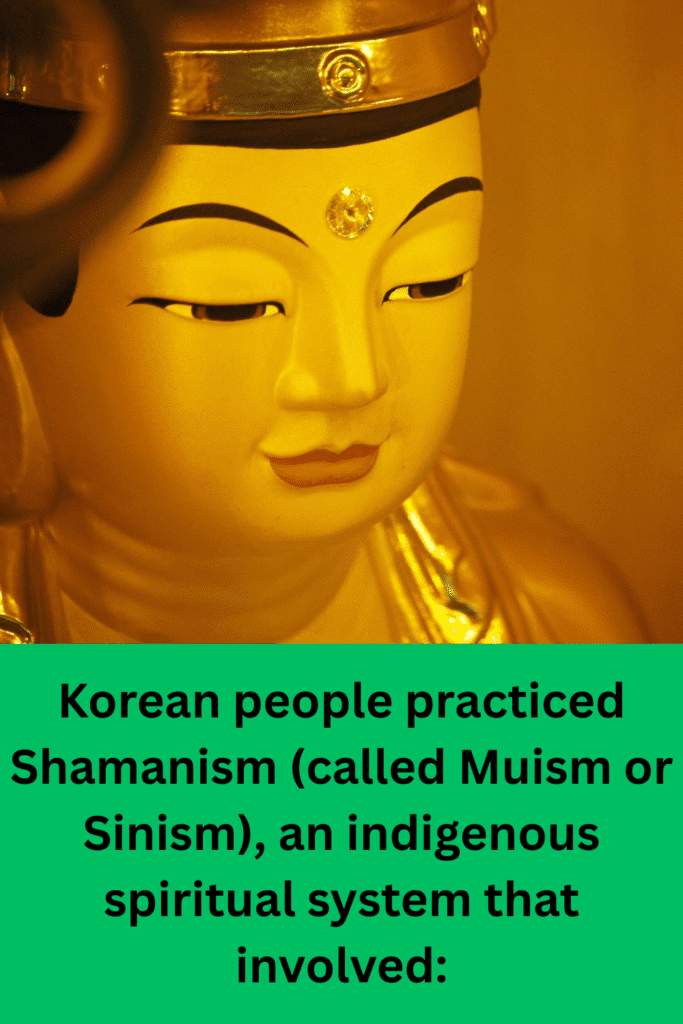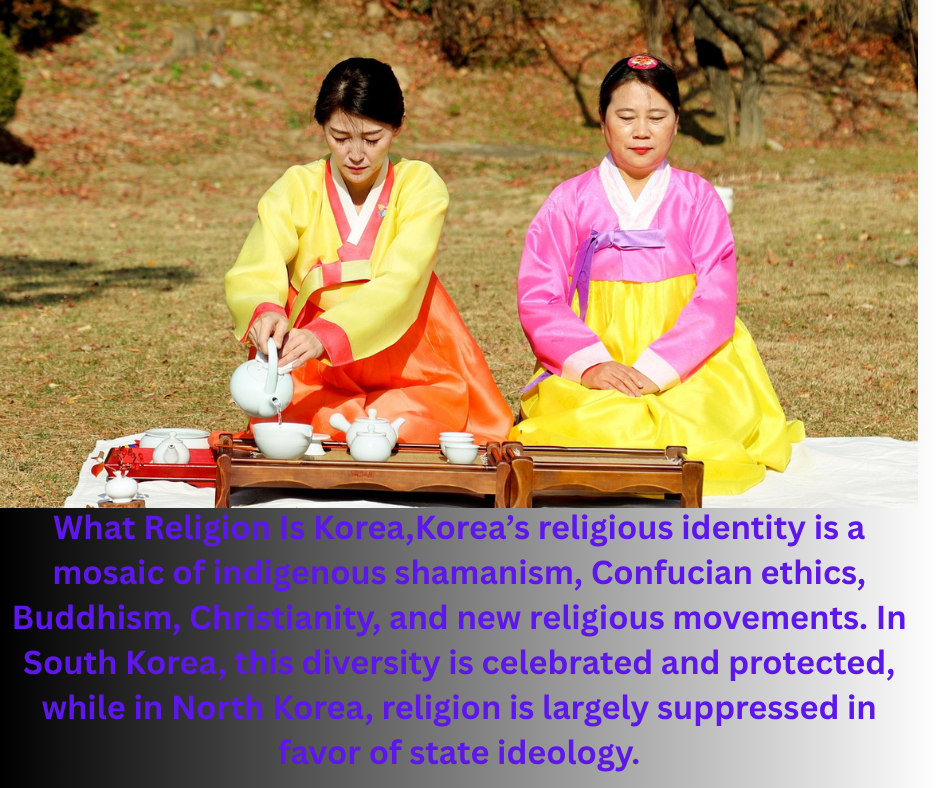Curious about what religion is followed in Korea? Explore the rich religious landscape of South and North Korea—from Buddhism and Christianity to Confucianism and Shamanism.
Introduction
When asking “What religion is Korea?” the answer isn’t as simple as naming one single faith. Korea has a rich, diverse religious history that includes indigenous beliefs, imported religions, and modern-day spiritual practices. From ancient shamanism to Confucian ethics, Buddhist temples, and Christian mega churches, Korea is home to a wide variety of religious expressions.

This article explores the religious traditions of both South Korea and North Korea, their historical development, major beliefs, and how they shape Korean culture and society today.
Table of Contents
Religion in the Korean Peninsula
What Religion Is Korea,the Korean Peninsula is split into two nations—South Korea and North Korea—with very different religious landscapes due to their political and historical paths.
- South Korea enjoys freedom of religion and has a pluralistic religious society.
- North Korea, under a strict communist regime, officially discourages religion but promotes a personality cult around its leaders.
Despite these differences, both parts of Korea have roots in traditional Korean spirituality and ancient religious influences.
Traditional Korean Religion: Korean Shamanism
Before the arrival of organized religions, the Korean people practiced Shamanism (called Muism or Sinism), an indigenous spiritual system that involved:
- Worship of nature spirits and ancestral ghosts
- Shamans (called mudang for women and baksu for men) who acted as mediums between the human and spirit world
- Rituals and ceremonies for healing, prosperity, and protection
Shamanism still exists today, especially in rural areas and even in urban centers, often blended with Buddhism or Confucian practices. What Religion Is Korea,Many Koreans, even if they follow another religion, consult shamans for life events like marriage, business openings, and health issues.
Confucianism: The Ethical Foundation of Korea
Confucianism isn’t technically a religion, but it plays a huge role in shaping Korean values and social behavior. Introduced from China during the Three Kingdoms Period, Confucian ideals emphasize:
- Filial piety (respect for parents and elders)
- Social harmony and hierarchy
- Education and self-cultivation
- Ancestor worship
Confucianism deeply influenced Korean government, family life, and even education systems for centuries. Today, it’s less a religion and more a moral framework embedded in Korean culture and etiquette.
Buddhism in Korea
Buddhism arrived in Korea from China in the 4th century and flourished for over a thousand years. What Religion Is Korea,Major contributions of Korean Buddhism include:
- Temples and monasteries like Bulguksa and Haeinsa
- Seon Buddhism (Korean Zen), focusing on meditation and enlightenment
- Artistic achievements in painting, sculpture, and literature
- Peaceful teachings on compassion, mindfulness, and karma
Though its dominance declined during the Joseon Dynasty due to Confucianism, Buddhism remains one of South Korea’s major religions today. Many Koreans, regardless of their primary religion, visit temples for festivals, meditation, or personal reflection.
Statistics (South Korea):
About 15% of the population identifies as Buddhist.
Christianity in South Korea
Christianity is among the most important religious developments in the recent history of South Korea. It arrived in the nation during the 1700s and 1800s, and it expanded quickly in the 1900s, especially following the Korean War.

South Korea is unique in Asia for having such a high proportion of Christians. It is now home to:
• Different Protestant groups, including Presbyterian, Baptist, Methodist, and others.
•Catholicgroups
Large congregations such as the Yoido Full Gospel Church are acknowledged as some of the biggest in the world.
Christianity in South Korea has contributed to:
- Educational institutions and hospitals
- Charitable organizations
- Social reform and political activism
Statistics (South Korea):
- Around 19% are Protestant
- Around 8% are Roman Catholic
- Total Christians: 27%–30% of the population
New Religious Movements in Korea
What Religion Is Korea,South Korea is also known for its many new religious movements that have emerged in recent decades. These often blend elements of Christianity, Buddhism, Shamanism, and nationalism.
Some notable examples:
- Cheondoism (Religion of the Heavenly Way): A native Korean religion influenced by Confucian and shamanic ideas. It played a role in Korean independence movements.
- Won Buddhism: A modernized form of Buddhism emphasizing unity and social engagement.
- Unification Church (founded by Sun Myung Moon): Known globally for mass weddings and its doctrine of a divine “True Family.”
- Shincheonji: A controversial Christian sect that gained attention during the COVID-19 pandemic.
These religions reflect Korea’s dynamic and evolving religious identity.
Religion in North Korea
In North Korea, the situation is vastly different. What Religion Is Korea,The government, led by the Kim dynasty, enforces atheism as state policy and promotes a cult of personality around its leaders.
Key features:
- Juche Ideology: A state ideology developed by Kim Il-sung, promoting self-reliance and viewing the leader as a god-like figure.
- Religious activities are highly restricted, and freedom of religion is virtually nonexistent.
- Some underground Christian churches are believed to exist, but practicing religion openly can lead to severe punishment, including imprisonment or death.
There are a few state-sanctioned churches and temples for show, mainly for international visitors, but these do not reflect genuine religious freedom.
The Rise of Non-Religious Koreans
Interestingly, despite the presence of many religions, a growing number of South Koreans identify as non-religious.
Current Trends:
- Over 55% of South Koreans say they have no religious affiliation.
- This rise is especially prominent among younger generations.
- However, many of these individuals still observe cultural or ancestral traditions, such as Chuseok (harvest festival) and memorial rites.
This indicates a broader global trend towards spirituality that is independent of organized religion.
How Religion Shapes Korean Culture
Religion in Korea influences many aspects of daily life:
- Language and customs: Honorific speech and respect for elders reflect Confucian ideals.
- Festivals: Religious and seasonal events like Buddha’s Birthday or Christmas are widely celebrated.
- Architecture: Temples, churches, and shrines dot the landscape.
- Manners and rituals: Ancestor worship is common, especially during holidays.
- Social behavior: Values like humility, hospitality, and community are rooted in religious traditions.
Even in a modern, high-tech society, Korea retains a spiritual and moral compass shaped by centuries of religious thought.
Conclusion
So, what religion is Korea? There’s no single answer. What Religion Is Korea,Korea’s religious identity is a mosaic of indigenous shamanism, Confucian ethics, Buddhism, Christianity, and new religious movements. In South Korea, this diversity is celebrated and protected, while in North Korea, religion is largely suppressed in favor of state ideology.
Understanding the religious landscape of Korea helps us appreciate its rich culture, resilient history, and deeply rooted values. Whether through prayer, ritual, or daily behavior, religion—both seen and unseen—continues to play a major role in the Korean way of life.